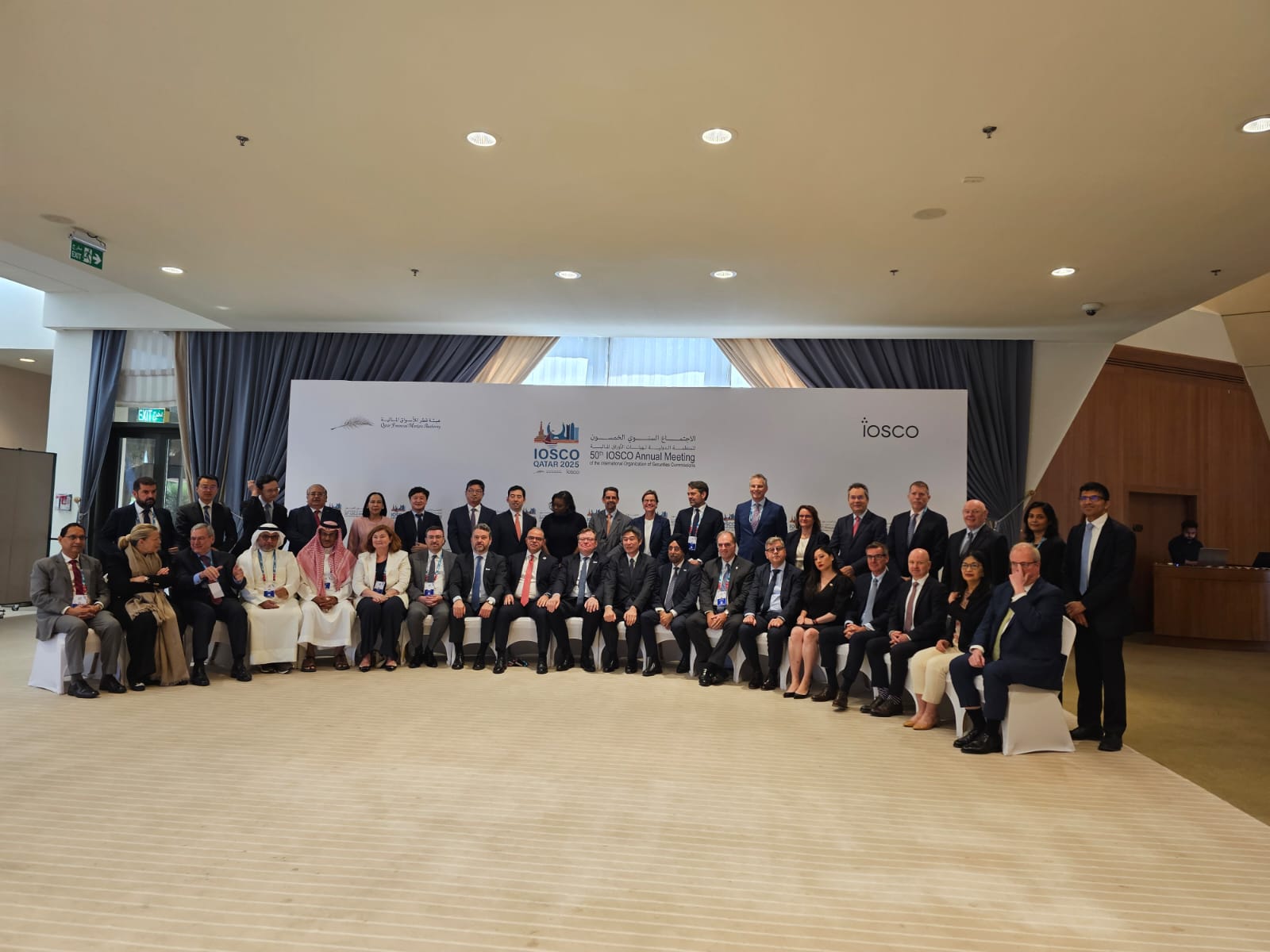Dr. Mohamed Farid – FRA Chairman:
- Capital markets require continuous regulatory readiness and flexibility to adapt to all changes, ensuring stability and development.
- Technological advancements demand proactive controls and tests for stronger investor protection.
- Ensuring regulatory frameworks integrate emerging technologies without destabilizing the market is crucial.
- Protecting individual investors is a paramount concern, especially with the rise of digital platforms and efforts are underway to increase awareness and mitigate risks.
Dr. Mohamed Farid, FRA Chairman and Vice Chair of the IOSCO Board, continued his participation at the IOSCO Annual Meetings in Doha by attending the Board meeting, where extensive discussions were held on the global regulation of capital markets and the priorities for achieving this amid economic shifts requiring continuous regulatory readiness and high flexibility.
This occurred as part of the IOSCO’s 50th Annual Meetings, held from May 12 to 16, where Dr. Mohamed Farid, FRA Chairman participated as Vice Chair of IOSCO and Chairman of the GEMC.
This participation reflects the Authority’s commitment to its role in shaping international regulatory trends and enhancing the integration of Egyptian capital markets with global standards. The meeting included discussions on the increased challenges facing capital markets in areas such as technological innovation, shifts in investor behavior and the development of financing instruments. The agenda also encompassed a range of points aimed at strengthening governance and regulating markets across various member countries.
The IOSCO Board’s discussions prominently featured fintech and the outcomes of the fintech task force’s work on utilizing artificial intelligence. Furthermore, thematic reviews of IOSCO recommendation implementation were covered, acknowledging the rapid digital transformation, expanding financial service access, increased participation of underserved groups in securities markets and the crucial need for regulatory frameworks to integrate emerging technologies without risking market stability.
Dr. Farid emphasized that fintech and the rapid advancement of digital transformation are now crucial for capital market growth. He highlighted Egypt’s experience in developing, regulating and supervising non-bank financial markets, demonstrating financial, investment and insurance inclusion is fundamental for any progress in this sector.
He cautioned that the increasing use of AI shouldn’t currently lead to staff reductions. Securities market authorities, he urged, should be mindful of this and manage AI’s applications effectively, especially concerning policies and strategy. He suggested linking this to the organization’s annual meeting efforts, drawing on data and surveys similar to those presented by Marlene Amstad, Chair of FINMA, whom he thanked. He proposed that the IOSCO should leverage this further by establishing a database to mitigate challenges related to data availability, underscoring that the primary function of all technology involves data collection followed by analysis.
Dr. Farid stressed that progress hinges on understanding technological developments, noting that capacity building is now easier due to readily available information. He differentiated between general AI for investment advice and supervised analytical AI.
Finally, FRA Chairman stated that developers of AI and robo-advisory software must be capable of conducting anticipated stress tests for their activities and handling emergency and complex scenarios to enhance risk protection.
Dr. Farid elaborated that the ongoing meetings facilitated an exchange of expertise on critical issues impacting global capital markets from the perspectives of development and effective regulation. A central focus was integrating efforts for greater financial stability, promoting sustainable finance and establishing regulatory frameworks for emerging fintech developments relevant to capital market operations.
The meeting’s dialogue session addressed recent global capital market trends and their impact on effective regulatory policies, systemic risks, and the need for continuous regulatory preparedness due to economic shifts.
Discussions then turned to the crucial matter of individual investor protection, particularly given the increasing use of digital platforms for financial services. The IOSCO Board explored adopting practical measures, including issuing regular guidance to digital platform providers to enhance their responsibility in preventing misleading and exploitative practices.
In line with IOSCO’s commitment to improve proactive hedging practices within capital markets, the meeting addressed a report concerning transparency and fairness challenges in capital market trading, which was developed based on consultations with all relevant stakeholders.
The meeting’s discussions extended to updating the responsibilities of the Affiliate Members Consultative Committee (AMCC) – which represents stock exchanges and other self-regulatory entities – with the aim of strengthening its advisory function and active participation in policy formulation, thereby expanding representation within IOSCO. In addition, the Finance and Audit Committee’s report concerning the 2024 financial statements and outstanding contributions was presented, reflecting the organization’s commitment to financial governance and institutional transparency.
A separate session was held with the Organization for Economic Co-operation and Development (OECD), attended by Carmine Di Noia, Director of Financial and Enterprise Affairs. They explored collaboration and aligning efforts on financial education and market governance, highlighting IOSCO’s intent to expand partnerships with influential international bodies. This aims to enhance regulatory policy effectiveness and directly link it to the review of regional and international risks, fostering more responsive regulatory efforts to evolving global capital markets.
Notably, IOSCO is a prominent international organization dedicated to setting the operational foundations and rules for capital markets, as well as the standards that countries strive to meet to ensure market fairness, transparency and efficiency and to manage associated risks. Its membership encompasses approximately 95% of the world’s securities market regulators.
Last modified: May 18, 2025
